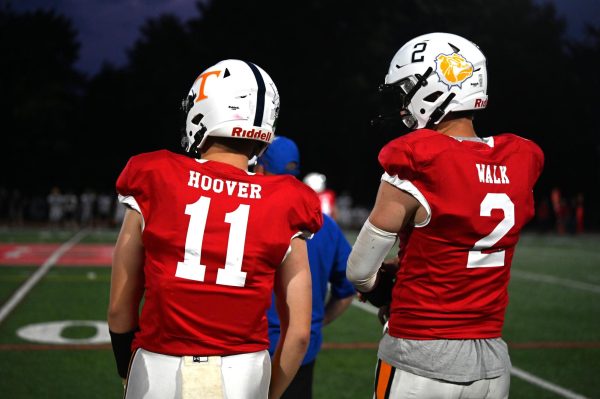Seniors: Why Are We So Stressed Out?
“It’s difficult to balance all of the activities and homework that I need to finish and get an adequate amount of sleep,” said Tyrone senior Brent McNeel.
The second we become high school seniors we are forced to make life changing decisions. We’re asked to choose our careers, our education after high school. We must make life changing financial decisions without training to do so.
Teens are being asked to plan the rest of their lives, yet we still have ask permission to use the bathroom. Seniors become sleep deprived, anxious and they over exert themselves, which then physically and mentally affects they way they perform at school. The pressure put on high school seniors to succeed is negatively affecting our mental health, and here’s how.
As a senior in high school, I think everyone can agree that too many teachers give copious amounts of homework. The average amount of time a high school student spends on homework ranges from one to three hours. After adding the hours of homework to the hours of a school day, that is eleven hours already out of a 24 hour day that a student is dedicating to school work. Then, after getting the recommended amount of sleep, which is nine hours, we are now down to four hours of free time, which would then usually then be dedicated to a job, sports, or socializing.
Another issue is that time management isn’t taught to most students, which also proves that high school doesn’t prepare us for the real world. We are taught the basics for college math and English which is great review for when we actually take the college course, however we’re not directly taught how to study, how to do taxes, or even how to keep a decent credit score. These are things that everyone does, so why aren’t we taught how?
Senior students are also expected to be involved in their communities. A lot of us join extracurricular activities outside of school, get part time jobs and join sports teams or clubs in the school to try and expand their college applications. The pressure on a student as a result of being on a sports team is challenging enough, but balancing school, a social life, and extracurricular activities in addition to that proves to be difficult.
“Personally, senior year has been extremely overwhelming because of of extracurriculars, school, and sports,” says Tyrone senior Ebonee Rice, “There is no time for me to complete college applications or apply to scholarships which set up my entire future. Trying to balance all of it is super stressful and I’m not able to get a proper sleep in order to be engaged in class the next day.”
We want to look good on our college applications, so seniors also juggle honors or dual enrollment classes. These types of classes are designed to be challenging to prepare us for college. But with constant due dates looming over them, challenging curriculum and constant homework, students taking these classes will mentally shutdown due to stress.
Nearly half of all students reported feeling a great deal of stress on a daily basis. This brings to attention the idea that high school seniors are often “burned out” before they get to college, meaning they lack the motivation and care to do well in school.
According to a study by NYU, “Grades, homework, and preparing for college were the greatest sources of stress for both genders.”
Students striving for good grades lose hours of sleep to study or to do homework which negatively affects their overall performance in the long run. Studies show the recommended amount of sleep teenagers should get is nine hours a night, which compares to the actual average amount a teenager gets which is seven hours.
This small two hour difference doesn’t sound like a big deal, but eventually the lack of sleep adds up and is called sleep deprivation. This then affects a student’s overall mood, behavior, cognitive thinking, and academic performance. A sleep deprived a teenager may become cranky and irritable and they’re more likely to participate in high risk behaviors such as cheating in school or drinking. Inadequate amounts of sleep also result in attention problems, memory loss, and issues with creativity. Studies also show drowsy students are also more likely to do poor in school.
“It’s difficult to balance all of the activities and homework that I need to finish and get an adequate amount of sleep,” said Tyrone senior Brent McNeel, “Not to mention all of the college applications and scholarships. it’s hard to be able to balance sleep with all of that. I find I am more irritable and disengaged in class because of lack of sleep.”
In addition to everything else seniors have to stress about, college applications are also mentioned. Filling out applications is stressful, and often require essays and letters of recommendation. The quick due dates and anxiety about getting accepted also makes the whole process of applying less than favorable for us.
We also have to pay money to apply. Most students are making minimum wage if they’re working, so they don’t have much money. We also have to pay for gas for our cars, and eventually thousands for college. An answer for the lack of money for college are student loans, which students eventually pay the university back the amount for their education, however, people often find themselves paying off student loans until they’re middle aged which may affect our future credit scores if not paid on time.
The mental toll that high school takes on seniors isn’t really discussed everyday. According to the National Association of Secondary School Principals one in five children and adolescents will face a significant mental health condition during their school years, and according to the Coalition to Support Grieving Students, close to one in five high school students have considered suicide, and 2 to 6 percent of children attempt suicide. Statistics like these are shocking.
With such a negative stigma that surrounds the idea of high school, there are things that need to change to better the mental health of their seniors.

What's up I’m Reagan Wood, and I am senior at Tyrone Area High School. I am the features editor this year and I cover activities students are involved...

This is Lucia’s fourth year in Eagle Eye and her third year as Photo Editor. She is very excited to express her creativity and find new ways to take...

Mr. Todd Cammarata, or "TCamm" as he is known to the Eagle Eye Staff, has been advising the Eagle Eye since 2013. He also advises the Eagle Yearbook...













Brody RIzzo • Nov 15, 2019 at 8:42 am
ok boomer